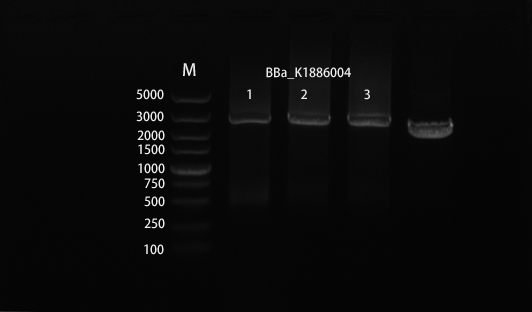Difference between revisions of "Part:BBa K1886004"
| Line 20: | Line 20: | ||
<partinfo>BBa_K1886004 parameters</partinfo> | <partinfo>BBa_K1886004 parameters</partinfo> | ||
<!-- --> | <!-- --> | ||
| + | <h2>'''Characterization'''</h2> | ||
| + | <h3> BACKGROUND </h3> | ||
| + | <h4>Overview</h4> | ||
| + | Registered Parts in our wiki is the subunit of the entire light-controlled system, each of which has no function. So I will introduce our light input part of our project after the combination of all the subunits in the page of part K1886006 | ||
| + | <br> | ||
| + | <h3>RESULTS</h3> | ||
| + | <br> | ||
| + | <h4>Gel electrophoretic analysis</h4> | ||
| + | [[File:CCAS.jpg|800px|thumb|left|Fig.1 Fig.1 Gel electrophoretic analyses of PCR products ]] | ||
| + | |||
| + | <br> | ||
| + | <br> | ||
| + | <br> | ||
Latest revision as of 01:16, 20 October 2016
sll1472 ccaS
CcaS is a green light-induced sensor protein from the genome of Synechocystis sp. PCC6803. It requires PCB as the chromophore to function. PCB is made by ho1 and PcyA. Furthermore, CcaS works in conjunction with CcaR, its response regulator. This is the green light sensor used by Tabor in his multichromatic light-sensing system which composed of CcaS/CcaR and Cph8/EnvZ.
This circuit is composed of the constitutive promoter and photosensitive protein gene ccaS. ccaS protein is membrane protein. After being activated by 520-nm light, it could transfer its phosphoryl group to the intracellular protein ccaR, and this process could be inhibited by 650-nm light
Sequence and Features
- 10COMPATIBLE WITH RFC[10]
- 12INCOMPATIBLE WITH RFC[12]Illegal NheI site found at 1077
- 21INCOMPATIBLE WITH RFC[21]Illegal XhoI site found at 2723
- 23COMPATIBLE WITH RFC[23]
- 25INCOMPATIBLE WITH RFC[25]Illegal NgoMIV site found at 285
Illegal AgeI site found at 1741 - 1000COMPATIBLE WITH RFC[1000]
Characterization
BACKGROUND
Overview
Registered Parts in our wiki is the subunit of the entire light-controlled system, each of which has no function. So I will introduce our light input part of our project after the combination of all the subunits in the page of part K1886006
RESULTS
Gel electrophoretic analysis

